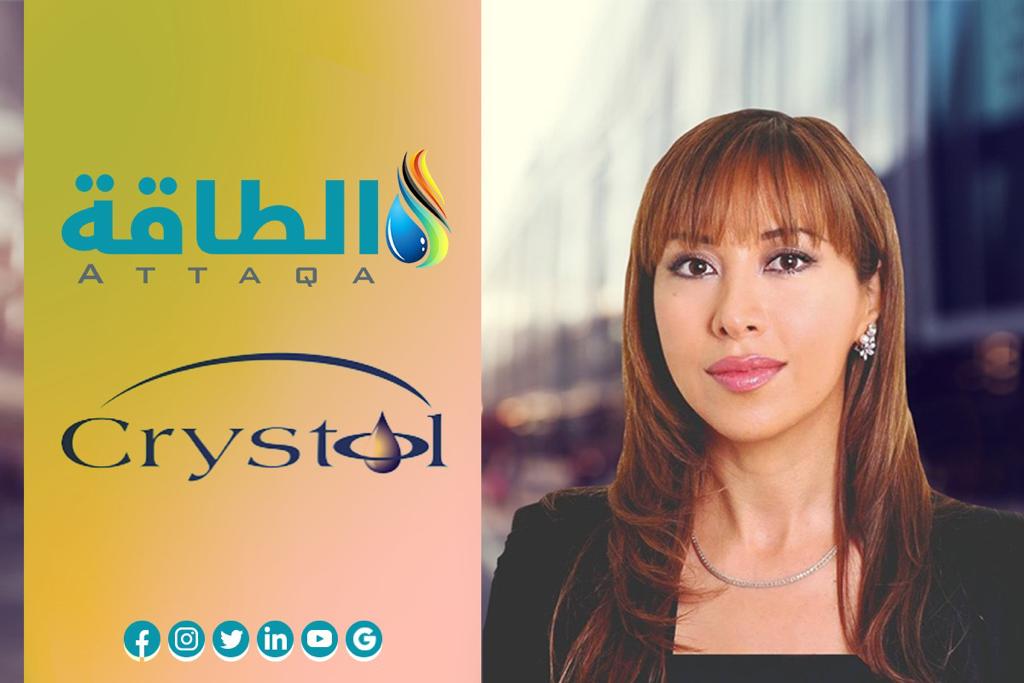In this interview given to Abdel Rahman Salah from ATTAQA platform, Dr Carole Nakhle, CEO of Crystol Energy, comments on the latest developments of the world energy markets and the outlook for the year ahead.

Oil Markets
ATTAQA: How do you see the situation of the oil markets now, a year after the Russian invasion of Ukraine?
Dr Nakhle: The same factors that largely shaped oil markets last year will continue to play an important role this year – primarily: global economic outlook, China post zero-covid policy and the war in Ukraine. Forecasts for the global economy are less gloomier than last year but the risk of slowdown and recession has not dissipated, with a potential negative impact on oil demand. China is a key factor – being the second largest oil consumer in the world and the second largest economy. Many are expecting a strong rebound in Chinese demand (the International Energy Agency (IEA) expects half of the growth in oil demand this year will come from China), but we cannot take this for granted. As His Excellency the Saudi energy minister wisely said ‘I believe it when I see it’. As for the war in Ukraine, it can still turn nastier and Russia – a major oil exporter – can still significantly cut its supplies. Should that happen, we can expect spikes in prices.
ATTAQA: Was the market ready for this war and its repercussions, especially with the calls of the IEA, before the war, to stop financing fossil fuel projects?
Dr Nakhle: Markets are never really prepared for wars as no one knows how long such wars can last nor their extent and damage. When the war in Ukraine started, we saw initial panic that was rather short-lived as the fears of major supply disruptions did not materialise. But the war has lent support to continuous investment in oil and gas – partly because of concerns about energy security and partly in response to higher prices. The calls that were made before the war to end investment in oil and gas have proven to be premature.
ATTAQA: Oil prices reached the $140/bbl mark in March 2022. Do you expect them to fall again by almost half?
Dr Nakhle: The spike in oil prices that we saw in March last year was primarily the result of panic rather than actual shortage of supplies. The IEA for instance warned that there could be a loss of nearly 3 million barrels a day of Russian oil resulting in a major crisis. Others expected even a bigger loss that would send prices to $300/bbl! Those fears did not materialise. Instead, what we saw is a redirection of oil trade flow with more Russian oil heading towards Asia and other important consumers. So instead of leaving the global market, the unwanted Russian oil simply left the European market and went to the Asian market. This is an important feature of oil markets which results in relatively short-lived crisis.
ATTAQA: Do you think that the European embargo on Russian crude oil and products will boost demand in the second quarter of this year?
Dr Nakhle: The EU’s sanctions on Russian oil and its products have been designed to curtail the revenues that Russia can generate without causing major supply disruptions. Russian oil has found alternative buyers to the European ones; while those buyers have benefited from purchasing Russian oil at well below market prices, but one can argue that consumers everywhere have also benefited because of the lower prices in international markets which in turn have helped to ease inflation. The two main factors that will shape demand this year will be the global economic outlook and Chinese growth.
ATTAQA: What are the expectations of Crystol Energy for oil prices in the second quarter of 2023? Will they reach the $100/bbl threshold again with the reopening of economic activity in China?
Dr Nakhle: Given the prevailing uncertainty related to the global economic outlook, China and the war in Ukraine with its impact on Russian supplies, we should continue to expect volatility in prices this year. Prices can still spike if Russia decides to significantly cut its exports – a scenario that we cannot rule out. But remember other dynamics are also at work – for instance, if China’s oil demand growth fails to materialise.
ATTAQA: Russian oil discounts reached Asia for about $35/bbl on Urals crude. Does this threaten the share of Gulf oil destined for Asia?
Dr Nakhle: The cheaper Russian oil is of course appealing to many customers particularly in Asia, and has created additional competition to some non-Russian oil, including Middle Eastern. Russia overtook Saudi Arabia as China and India’s largest oil supplier by the end of 2022. However, we shouldn’t forget that the Russian oil lost market share in its important conventional market – that is Europe – and that share has been captured by some Middle Eastern producers. In the longer term, the Middle Eastern oil powerhouses are better placed to regain any market share that they may have lost in Asia and even expand it. After all, Asia will be the growth center for oil demand for some years to come.
ATTAQA: Did OPEC + succeed in leading the oil market to cross the crisis of invading Ukraine?
Dr Nakhle: OPEC+ has been monitoring oil markets closely and has unique insights which drive their output decision. The raison d’être of OPEC is to stabilise the market, which is by itself a challenging task as volatility has been a dominant feature of the market right from its early days.
ATTAQA: Does the presence of Russia in OPEC+ put pressure on the future decisions of the alliance, especially after Moscow announced a reduction in its production by 500,000 barrels per day (b/d) from the beginning of this March?
Dr Nakhle: Given the importance of Russia as a major oil producer and exporter, OPEC+ has to take into consideration the outlook for Russian production irrespective of the country’s participation in the producers’ group alliance. The decline in Russian oil production is expected, and 500,000 b/d is actually less than what OPEC expects for this year whereby in their monthly oil market report the figure is around 850,000 b/d but this is still less than what the IEA expects (around 1.4 Mb/d of loss of Russian oil this year). However, Russian oil production is one of several key factors OPEC+ will take into consideration when deciding on its next steps.
Gas Markets
ATTAQA: The demand for Liquified Natural Gas (LNG) and prices reached historical levels after the Russian war. How do you see this?
Dr Nakhle: Europe and Russia have been tied into a relationship that spans decades when it comes to gas trade, particularly pipeline gas, where Russia was the largest supplier to the region. So it was not surprising to see market reaction when that relationship got broken, especially that it happened on top of other developments that were already putting upward pressure on gas prices in Europe well before the war in Ukraine started. In fact, 2022 was probably ‘annus horribilis’ for energy markets in Europe. However, the crisis also showed that LNG is playing an important role in making gas markets more fungible and more global unlike pipeline gas which keeps gas trade more of a regional affair. And it was a question of few months before we saw LNG tankers queuing at European terminals as high prices attracted LNG supplies.
ATTAQA: Many countries have taken investment decisions in gas projects after the Ukraine war. Will this lead to a fall in prices?
Dr Nakhle: The crisis has not only resulted in higher gas prices but also in supporting investment in gas, particularly as the tone of policymakers changed in favour of such investments. The EU scrambled to find alternative supplies to Russian gas, openly supporting investment in the gas sector both in the region (the cooperation with Norway announced in June last year is one example) and elsewhere (like Africa and the Middle East). Germany, which was heavily reliant on Russian gas, built an LNG importing facility in record time. Higher investment in gas will lead to potentially higher supplies.
ATTAQA: Algeria and Egypt have emerged at the forefront of the Arab countries that Europe has turned to secure gas supplies. Can they be relied upon to compensate a large part of the Russian gas?
Dr Nakhle: North Africa, particularly Algeria and to a smaller extent Egypt, has been an important supplier of gas to Europe, so it is not surprising that the region topped the list as the EU was looking for alternative supplies to Russian gas. However, while North Africa has helped to appease the pressure on prices in Europe, its upside potential to replace Russian gas is limited under existing conditions. In both countries, but even more so in Algeria, domestic demand is eating away from export capacity, and more investment is needed in those two countries to support greater export potential.
ATTAQA: What do you think of the European Union (EU) gas deal with Egypt and Israel?
Dr Nakhle: The EU had to look at every country that has gas to help it avert a serious crisis. After all, Russia was the biggest gas exporter to the region for decades. No single country can fill the gap resulting from loss of Russian gas supplies in the short- or not even mid-term. Israel’s gas can support Egypt’s export capacity but on its own it plays a marginal role. But as the saying goes, in time of crisis, every little helps!
ATTAQA: Many Arab countries, such as Qatar and the Sultanate of Oman, are turning to long-term LNG deals. Is this the appropriate solution to ensure price volatility?
Dr Nakhle: It would be a mistake to take volatility entirely out of markets – besides it is an almost impossible task. Markets are quite efficient at allocating resources even though this may not be swiftly visible. Of course, long-term contracts have played and will continue to play an important role in gas trade but if all gas was sold under long-term contracts, I doubt the gas crisis that we saw in Europe last year would have passed so ‘quickly’. High prices simply attracted spot LNG to the market and alleviated what could had been a major problem for Europe.
ATTAQA: Does the gas market need an organisation like OPEC for market management and stability?
Dr Nakhle: People have been talking a gas replica of OPEC, but mind you gas markets are pretty different from oil: for instance, the majority of the oil produced is traded globally, whereas a fraction of the gas produced follows that path and more than 12 pricing mechanisms exist for gas, varying with market conditions and contracts. Given that reality, I find it hard to see how a GPEC can work.
ATTAQA: Morocco has emerged among the most recent Arab countries to achieve gas discoveries. What do you think of the announced reserves figures so far? Will the Kingdom enter the list of producing countries soon?
Dr Nakhle: Morocco already produces gas but in marginal quantities. There is still notable speculation about the gas reserves in Morocco, as it is not clear whether the figures reported are those that have been technically discovered or commercially proven. Any increase in production should help Morocco to reduce its dependence on coal for power generation.

Renewable Energy
ATTAQA: Has the Ukraine war succeeded in pushing the global renewable energy sector towards further recovery?
Dr Nakhle: The war in Ukraine has boosted interest and investment in all sorts of energy, with green energy receiving particularly favourable treatment – an acceleration of previous trends. In May 2022, the EU published a report entitled RepowerEU where renewable energy targets are set higher. Whether these will be met remains to be seen. But we are also seeing unhealthy subsidies competition between major powers namely the EU, US and China. The US Inflation Reduction Act (IRA) – a $370 billion package – for instance has caused discontent in the EU which sees the act providing ‘unfair subsidies’ to US firms investing and operating in the green energy sector and in response the European Commission announced the Green Development Industrial Plan (GDIP), a 600 billion euro subsidy program. While the green energy transition requires strong government support, it also needs cooperation between countries, not this kind of unhealthy competition.
ATTAQA: What are the most prominent Arab models for which Crystol Energy expects more excellence in clean energy?
Dr Nakhle: We are seeing ambitious projects announced and targets set in the MENA region, particularly in the Gulf Cooperation Council (GCC), where governments have the financial and natural resources as well as the right expertise to pursue such projects. In this respect, Saudi Arabia and the UAE particularly stand out. Projects such as Helios green hydrogen in Saudi Arabia can put the region at the forefront of the green energy transition. In my opinion, the region illustrates the sensible approach for the energy transition: meeting both climate security and energy security by complementarity not substitution at least until renewable energy technologies reach the point of greater scale, reliability and storage.
Related Analysis
“Averting a full-blown gas crisis in Europe“, Dr Carole Nakhle, Feb 2023
“Oil markets: An early peek into 2023“, Dr Carole Nakhle, Jan 2023
Related Comments
“Oil & gas markets outlook one year after the Russian-Ukraine conflict“, Dr Carole Nakhle, Feb 2023
“Europe and its energy challenge“, Dr Carole Nakhle, Jan 2023









